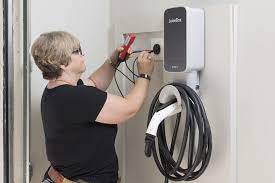Are you considering switching to an electric car and wondering about the cost of installing an electric car charger at home? The convenience and cost savings of charging your electric vehicle (EV) at home can be substantial. In this guide, we’ll explore the factors that affect the cost of installing an electric car charger at home and provide you with valuable insights on what to expect.
Understanding the Basics
How Much To Install Electric Car Charger At Home
Before delving into the details of the installation costs, let’s begin by understanding the fundamental aspects of installing an electric car charger at home.
Types of Electric Car Chargers
There are various types of electric car chargers available, each with different capabilities and charging speeds. The most common types include:
- Level 1 Charger: These chargers use a standard 120-volt household outlet and are the slowest, typically providing 2 to 5 miles of range per hour of charging.
- Level 2 Charger: Level 2 chargers require a 240-volt circuit and are significantly faster, offering approximately 10 to 60 miles of range per hour.
- Level 3 Charger (DC Fast Charger): These are high-powered chargers commonly found at public charging stations, capable of delivering a substantial charge in a short time.
Factors Affecting Installation Costs
Several factors can influence the cost of installing an electric car charger at home:
- Charger Type: The type of charger you choose will significantly impact the installation cost. Level 2 chargers are more expensive to install than Level 1 chargers due to the need for a dedicated 240-volt circuit.
- Electrical Panel Capacity: Your home’s electrical panel must have the capacity to support the additional load of an electric car charger. Upgrading the electrical panel may be necessary and can increase installation costs.
- Distance from Electrical Panel: The distance between your electrical panel and the charger’s location can affect installation costs. Longer distances may require more extensive wiring, conduits, and labor.
- Permitting and Inspection Fees: Many localities require permits and inspections for electrical work. These fees can add to the overall cost of installation.
- Labor Costs: Labor costs can vary depending on your location and the complexity of the installation.
Cost Breakdown
How Much To Install Electric Car Charger At Home
Now that you understand the factors involved, let’s break down the costs associated with installing an electric car charger at home.
Charger Cost
The cost of the electric car charger itself varies based on the manufacturer, features, and charging speed. Level 1 chargers are the most affordable, often priced between $200 and $600. Level 2 chargers can range from $400 to $1,200 or more, while Level 3 chargers are significantly more expensive, often costing several thousand dollars.
Electrical Panel Upgrade
If your home’s electrical panel doesn’t have the capacity to support a Level 2 charger, you may need to upgrade it. An electrical panel upgrade can cost between $1,500 and $3,000, depending on the complexity of the job.
Wiring and Installation
The wiring and installation costs depend on various factors, including the distance from the electrical panel to the charger location, the complexity of the installation, and local labor rates. On average, you can expect to pay between $300 and $1,500 for installation.
Permitting and Inspection Fees
Permitting and inspection fees can vary widely depending on your location. They typically range from $100 to $500 or more.
Total Cost
To estimate the total cost of installing an electric car charger at home, you can add up the charger cost, electrical panel upgrade (if needed), wiring and installation, and permitting and inspection fees. On average, the total cost can range from $1,000 to $5,000 or more.
Cost-Saving Tips
How Much To Install Electric Car Charger At Home
While the cost of installing an electric car charger at home can be significant, there are ways to minimize expenses:
- Take Advantage of Incentives: Some states and utility companies offer rebates or incentives to encourage the installation of home EV chargers. Check if any such programs are available in your area.
- DIY Installation: If you’re comfortable with electrical work and local regulations allow it, you can save on installation costs by doing some of the work yourself. However, be cautious, as electrical work can be dangerous if not done correctly.
- Choose a Location Wisely: Installing the charger in a location that minimizes the distance from the electrical panel can help reduce installation costs.
- Get Multiple Quotes: When hiring a professional for the installation, it’s a good idea to get quotes from multiple electricians to ensure you’re getting a competitive price.
Read too:
Conclusion
Installing an electric car charger at home is a convenient way to ensure your EV is always ready to go. The costs involved can vary, but with the right choices and planning, you can manage the expenses effectively.
In summary, when considering “How Much To Install Electric Car Charger At Home,” it’s essential to factor in the charger type, electrical panel capacity, distance from the panel, permitting and inspection fees, and labor costs. By understanding these elements and exploring cost-saving options, you can make an informed decision and enjoy the benefits of charging your electric car at home.
So, go ahead and make the switch to an electric vehicle – the convenience of home charging is well worth the initial investment!
